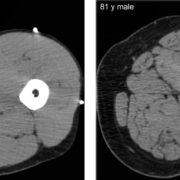Essential Amino Acids for Older Adults
One of the issues we all face as we get older is the loss of muscle mass; the technical term is sarcopenia. While some of the loss can be attributed to declining hormone levels as well as the decline in physical activity, we tend to eat less protein as we get older. Less protein intake means less muscle and other protein synthesis.
Researchers in Japan wanted to see if increases in muscle mass were related to protein intake, specifically EAAs. Instead of jumping right into supplementing with EAAs, they recruited 10 older men with a mean age of 69 and gathered nutritional information using a three-day dietary record. They put the men on a progressive weight training program, lifting three days per week for 12 weeks.
All men gained muscle mass, about one pound of muscle per leg. In analyzing the diet, the average protein intake was 99 grams of protein per day with 37 grams from EAAs. What they found was that those men with higher EAA intake, especially leucine, had a greater increase in muscle mass. It was even better if they had the EAAs with their breakfast.
This was a small preliminary study that examined current food intake with no intervention other than exercise. It may indicate that in order to be efficient at adding muscle mass, EAAs are important in older adults. What does this mean for you if you’re in that age group or an athlete wanting to add muscle mass? I’ll let you know on Saturday.
What are you prepared to do today?
Dr. Chet
Reference: J Nutr Sci vitaminol (Tokyo). 2017;63(6):379-388. doi: 10.3177/jnsv.63.379.









